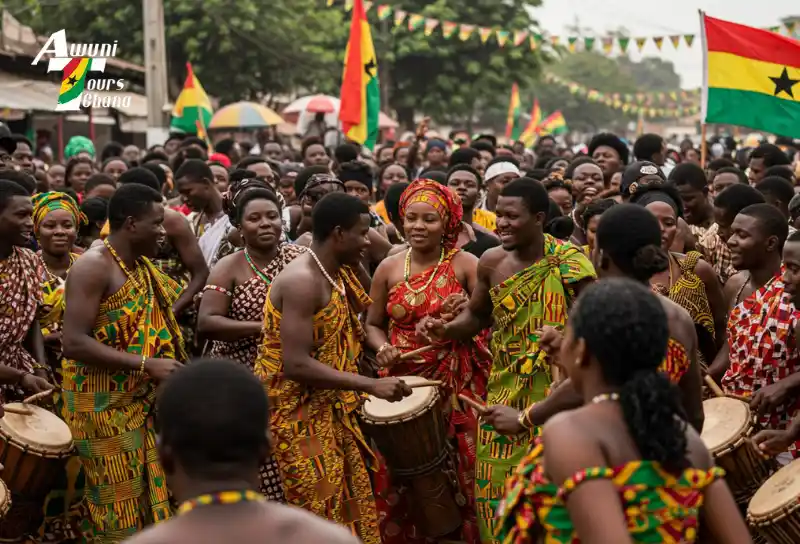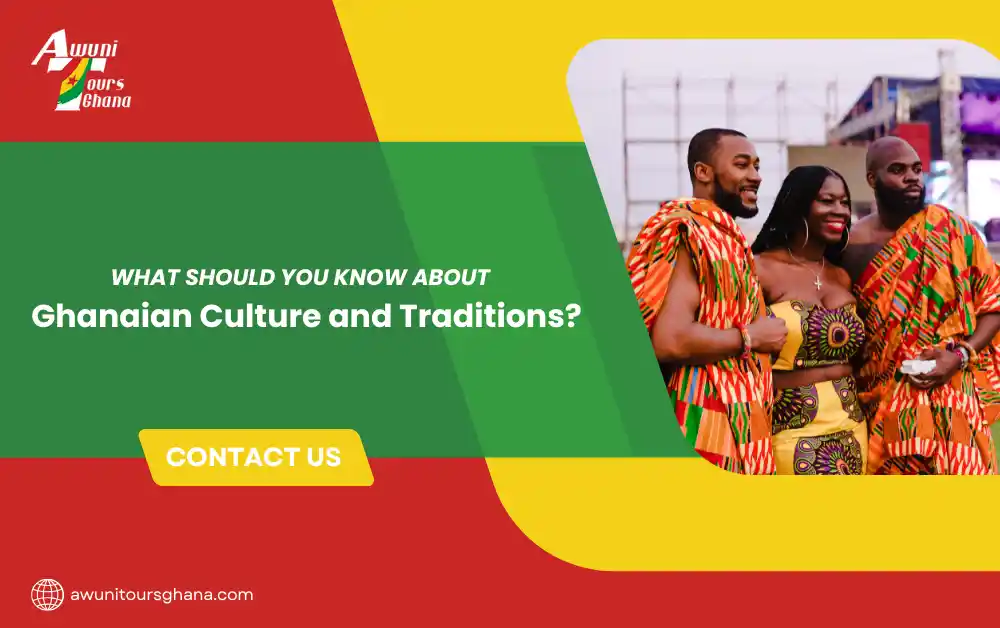Ghana is a peaceful country that is well known for its rich culture and deep traditions. These traditions are not just about the past; they are part of everyday life across towns, cities, and villages. From the way people dress, greet each other, and celebrate, to how they cook and care for their families, Ghanaian culture is full of meaning, respect, and community values.
Whether you’re planning to visit during Ghana holidays or just studying Africa culture and tradition, understanding Ghanaian culture and traditions will help you connect with the people and appreciate their way of life.
What Should You Know About Ghanaian Culture and Traditions?
Ghanaian culture includes many traditions and customs that people still follow every day. Let’s discuss some of the most important parts of Ghana’s culture and customs:
1- Respect in Ghanaian Culture
One important part of Ghanaian culture and tradition is showing respect, especially to elders and leaders. In Ghana, it is common for people to greet one another warmly before starting any conversation. Greetings show good character and are often done with a smile and a handshake using the right hand.

When speaking to older people, they usually add respectful titles like “Auntie,” “Uncle,” or say “Sir” or “Madam.” Among some ethnic groups, like the Akan, younger people also slightly bend their knees when greeting someone older. These simple actions show how much value Ghanaians place on politeness and tradition.
2- Family Culture
In Ghanaian culture and customs, the family is the heart of society. It’s not just about parents and children, extended family and even neighbours are considered important.
Most Ghanaians live in strong family networks, where grandparents, cousins, aunties, and uncles all help raise children and support each other. Family ceremonies like births, marriages, and funerals are shared events where everyone comes together to show love and support.

In many communities, the entire village acts like one big family. This strong family connection is a powerful part of Ghanaian culture.
If you want to participate in such meaningful experiences, take a look at our tour packages, which offer authentic opportunities to connect with local communities.
3- Traditional Clothing
One of the most beautiful things about Ghana culture is its traditional dress. On special occasions and Ghana holidays, people proudly wear their best cultural outfits.
The most famous fabric is Kente, a colorful, handwoven cloth full of traditional symbols and meanings. It is worn by both men and women, especially during festivals and royal events.

Women often wear “slit and kaba,” a wrap skirt with a matching blouse made from local fabric, while men may wear smocks or wrap a cloth over one shoulder in the Ashanti style. Traditional Ghanaian clothing shows pride in heritage and connects people to their ancestors.
4- Naming Tradition
Names in Ghana carry powerful meaning and are often tied to the day of the week a child is born. For example, a girl born on Monday is called Adwoa, and a boy is called Kwadwo. Each name has a spiritual meaning and is believed to describe a person’s character.

Names may also be given based on family history, special events, or in honor of ancestors. This unique naming system is a strong part of the culture of Ghana, passed down from one generation to the next.
5- Festivals and Ghana Holidays
Festivals are an exciting and colorful part of Ghanaian culture. Every ethnic group in Ghana has its own festivals that are celebrated with dancing, drumming, and traditional clothing. Some well-known Ghana holidays and festivals include:
- Homowo (by the Ga people): Celebrates the end of hunger and welcomes a good harvest.
- Aboakyer: A lively deer-hunting festival to honour the gods.
- Akwasidae (by the Ashanti): Held every six weeks to remember ancestors and honour chiefs.
These Ghana holidays are not just for fun; they help to pass on values, bring families together, and keep traditions alive.

Many of these festivals take place in some of the most vibrant cities and scenic areas in the country, such as Accra, Kumasi, and Cape Coast. You can explore more in this guide on the best places to visit in Ghana.
6- Traditional Beliefs
Traditional beliefs also play an important role in this culture. According to the Embassy of Ghana, 71% of the population is Christian, while 17% are Muslim. But they still follow ancestral customs and practices. In some communities, people visit shrines or traditional priests, also known as fetish priests, to ask for healing, protection, or advice.

Many believe in the power of ancestral spirits who guide and protect their families. Sacred trees, rivers, and rocks are also respected as spiritual places. These practices are an important part of Ghanaian culture, which shows a deep connection between the natural world and the spiritual world.
7- Food and Eating
Ghanaian food is rich, flavorful, and full of variety. It reflects the culture of Ghana through ingredients, cooking styles, and customs.
Popular dishes include:
- Fufu: It is made by pounding cassava and plantain and eaten with light soup or palm nut soup.
- Banku: It is made from fermented corn dough and is usually served with tilapia and pepper sauce.
- Waakye: It is a mix of rice and beans, served with stew, boiled eggs, and fried plantain.
- Jollof rice: A favorite in many West African countries, including Ghana.

Traditionally, Ghanaians eat with their right hand, not with spoons or forks. Eating together is a sign of love and respect in Ghanaian culture.
8- Music and Dance
Traditional music in Ghana uses local instruments like drums, bells, and flutes. These instruments are used during festivals, religious ceremonies, and social events.

One popular dance is the Adowa, performed mostly by the Ashanti people. It is a graceful dance, especially by women, where every hand movement carries a meaning.
Other dances like Kpanlogo, popular with the Ga people, are energetic and often involve group performances. Through music and dance, Ghanaians tell stories, celebrate events, and express their emotions. These traditions keep the culture of Ghana alive and joyful.
9- Social behaviour
Cultural values also shape daily customs in Ghana. People are taught from a young age to greet others, especially elders, before starting any conversation. It is important to use the right hand when giving something, whether it’s money, food, or a handshake.

Children are expected to show respect, help older people, and behave politely in public. These everyday habits may seem small, but they are an important part of Ghanaian culture and show the kindness and discipline that Ghanaians are known for.
Conclusion
Ghanaian culture and traditions are full of life, meaning, and deep respect for family, community, and history. From the unique naming system and colorful clothing to the vibrant festivals, traditional foods, and respectful customs, every part of daily life in Ghana reflects its rich cultural roots. These customs are not just practices from the past; they are still honored and followed today across the country.
And if you’re thinking of seeing it for yourself, Ghana is a warm and welcoming destination with so much to offer. If you still have any confusion, don’t miss our full guide on why you should travel to Ghana; it just might inspire your next adventure.
FAQs
1- Are Ghanaian festivals open to visitors?
Yes, many festivals welcome both locals and visitors. They offer a great way to experience Ghanaian culture through music, dance, traditional dress, and food.
2- Is religion important in Ghanaian culture?
Yes, most Ghanaians are religious, mainly Christian or Muslim, but traditional spiritual beliefs and customs are also practiced and respected in many communities.
3- What are some important Ghanaian traditions?
Important traditions include naming children by the day of the week they were born, honoring ancestors, wearing traditional attire, and celebrating festivals like Homowo and Aboakyer.
4- How is family important in Ghanaian culture?
Family is central to Ghanaian life. It includes extended relatives, and family members support one another during celebrations, challenges, and daily life.

